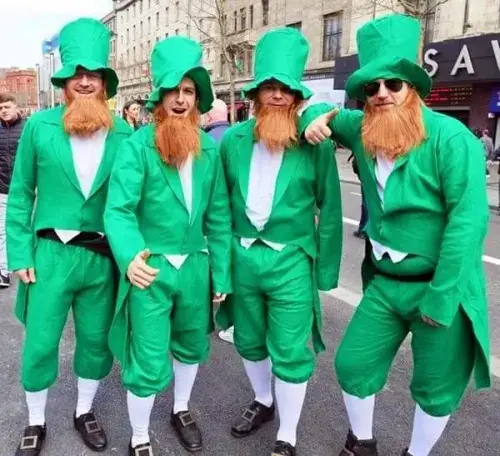Ireland. What’s the first thing that comes to mind when someone mentions “Ireland“? Beer, the sea, red-haired people, leprechauns, or maybe shamrocks? Today, I’m here to challenge many common stereotypes about Ireland and offer you a fresh perspective.
After all, I’ve been there and enjoyed a pint myself! A visit to the Drogheda Museum opened my eyes to some surprising facts.
For example, let me tell you that Ireland is not as full of redheads as people often assume. And when it comes to beer consumption, despite Dublin’s reputation for Guinness, the Irish aren’t the world’s biggest drinkers.
Curious to learn more unexpected facts?
Ireland, Let’s dive in!
Only 10% of Irish People Have Red Hair! The Irish are often associated with fiery red-haired men and beautiful women. But let’s break this stereotype with some solid statistics—only about 10% of the Irish population has naturally red hair. Surprised?
Dracula Has Irish Roots.
Many know that Bram Stoker’s novel Dracula was inspired by a real historical figure—Vlad III Basarab, better known as Vlad the Impaler, the 15th-century ruler of Wallachia (modern-day Romania).
But here’s a twist—some historians believe that Stoker, born and raised in Dublin, was actually influenced by Irish folklore when shaping his famous vampire.
According to legend, Vlad was pale as a ghost (which fits the vampire image), terrorized his people, and was feared as a sorcerer.
The story goes that when his subjects had enough, they convinced a warrior to kill him—not once, but twice.
Each time, Vlad rose from the grave demanding loyalty. It was only when the warrior, following a druid’s advice, beheaded him with a sword and buried him upside down with a massive stone on his grave that Dracula finally stayed dead.
Ireland’s Pirate Queen.
Gráinne Mhaol, also known as Grace O’Malley, was the daughter of a clan leader, a rebellious Irishwoman, and a force to be reckoned with in the 16th century. After her father’s death, she defeated her own brother in fair combat to claim leadership.
Her chosen profession?
Piracy.
She mastered sword fighting, battled men as an equal, and was both fearless and strategic—a skilled politician as well.
One legend claims that the courageous Grace joined a naval battle against Algerian pirates just one day after giving birth, telling her crew that childbirth was worse than combat.
Now that’s a woman with a fighting spirit! But did you know about Ireland’s pirate queen?
Ireland is the World’s Second-Largest Tea Consumer.
According to statistics, the Turks take first place when it comes to tea consumption, while the Irish proudly hold the second spot. And surprisingly, the UK only comes in third.
St. Patrick’s Day: A Global Celebration.
St. Patrick’s Day, celebrated on March 17, is a national holiday in Ireland, Northern Ireland, and Canada’s Newfoundland and Labrador province.
Interestingly, in Canada, the festival gained popularity thanks to the Guinness beer brand. Dublin and many other Irish cities host parades, festivals, and, of course, beer-fueled celebrations. The symbols of the holiday? The shamrock, the Irish flag, and leprechauns.
Leprechauns, the most famous fairy creatures in Irish folklore, have been around since the Middle Ages. Traditionally, they were depicted as tall, elderly men—not the small, mischievous, green-clad characters we see today.
In Chicago, the city even dyes its river green for St. Patrick’s Day, creating a truly spectacular sight!
The celebration isn’t limited to Ireland—it’s widely observed in the UK, Canada, the US, Argentina, Australia, and New Zealand.
Guinness is More Popular in Nigeria Than in Ireland.
Surprising but true! Out of the 150 countries where Irish Guinness is sold, Nigeria tops the charts in both consumption and production.
Yes, more Guinness is enjoyed in Nigeria than in Ireland itself!
Irish Philosophy, A Lesson in Optimism.
One of the most fascinating aspects of Irish culture is their unique outlook on life—something the rest of the world could learn from. I love this piece of Irish wisdom:
*”There are only two things to worry about: whether you are healthy or sick. If you are healthy, you have nothing to worry about. If you are sick, there are only two things to worry about: whether you will recover or die.
If you recover, you have nothing to worry about. If you die, there are only two things to worry about: whether you go to heaven or hell.
If you go to heaven, you have nothing to worry about. And if you go to hell, you’ll be so damn busy shaking hands with friends that you won’t have time to worry!”*
Now that’s an optimistic philosophy!
As I wrote, I have visited Ireland, specifically good memories from a small city Drogheda. Watch my video:
Did you know these fun facts about Ireland? I bet at least some of them surprised you.
Have a great day! 🍀







Smart philosophical musings, I would also add that no one will escape death and it is inevitable whether you go to church every day or sit in a pub.